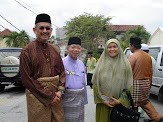To Fix Islam, Start From the Inside
The best way to fight radicalism is to empower Muslim women worldwide.
By Irshad Manji
NEWSWEEK
Published Dec 31, 2008
President will not need any 3 a.m. phone calls to keep him awake. Figuring out how to restore the United States' moral authority in the Islamic world —while encouraging Muslims to reform themselves—would stop anyone from sleeping soundly.
The solution will require more than success in Iraq or the Palestinian territories. After all, most Muslims live outside the Middle East, and Washington must learn to acknowledge their worth. Doing so demands a foreign-policy rethink. Instead of being driven strictly by counterterrorism, the United States' approach to Muslims should be complemented by a universal human-rights thrust—a cooperative strategy that recognizes ordinary Muslims, especially women, to be immediate targets of jihadism, as well as indispensable partners in the fight against it.
Such a foreign policy would not only improve the United States' global image, it would also allow Americans to form smart alliances and make even smarter use of tools like microcredit. And it would intensify the U.S. pursuit of rights-abusing thugs—those who bomb, behead, bury alive or beat up civilians. Not coincidentally, these are often the same criminals who threaten U.S. security. A textbook example is the Iranian government, which makes everyday Muslims its first victims. Last year the regime arrested Zohreh and Azar Kabiri, 20-something mothers, on charges of adultery. The sisters got 99 lashes each before being sentenced to be draped in white sheets, lowered into dirt pits and stoned to death with fist-size rocks.
Islamic law can be brutal; no amount of cultural theorizing erases this fact. But as a faithful, feminist Muslim, I know that seventh-century cruelty is not inevitable in the 21st century. Human interpretations of divinely inspired words are exactly that—human, fallible and subject to reversal. In October, during the United Nations' annual debate about children's rights, Iran announced its intention to reduce juvenile executions. Campaigns in more than 80 countries and local activists prodded Tehran to that point. The next step is follow-through, and savvy pressure by the United States and other nations can help. The trick for Washington is to listen and learn: listen to dissidents who seek support, respect those who do not and learn from those with a track record of triumph.
Let the record show that human dignity can win. Ahmad Batebi is an Iranian democracy advocate who has faced certain execution more than once over the past decade. A 1999 photo of him—captured in the midst of a bloody protest—circulated worldwide on the cover of a Western magazine. The fallout apparently induced cold feet at the gallows. Batebi's execution was postponed long enough for him to flee to the United States, where he now lives. Western attention also advanced the recent case of a Saudi woman who was gang-raped, then threatened with jail for "dishonoring" her community. Late last year a media uproar amplified by U.S. broadcasters compelled King Abdullah to take the extraordinary step of pardoning her.
Given these nonviolent victories, why do citizens and governments of the West often bristle at the notion of getting involved? Put bluntly, too many freeze in fear of being deemed racists for taking up "other" people's business. But as the economy has rudely reminded us, ours is an interdependent age in which the "other" is a mirage. Muslims inhabit the same world as non-Muslims. No wonder a rising number of Islamic scholars—such as Prof. Bassam Tibi of Germany and Abhdullahi Ahmed An-Naim, a Sudanese-American and renowned expert in Sharia—argue that everyone should enjoy the same freedoms of thought, conscience and expression.
This is not to counsel more military invasions to rescue Muslims from each other. Exactly the opposite: Washington's fixation on counterterrorism reduces Muslims to the status of perceived anti-American conspirators, creating enemies out of those who ought to be Lady Liberty's fiercest allies. Foremost among them are Muslim women, who have the most to gain from reform within Islam. Ultimately, it is women who will help Muslims help themselves. The new U.S. president can benefit the Islamic world by engaging the entrepreneurial talents of Muslim women.
http://www.newsweek.com/id/177388
































0 comments:
Post a Comment